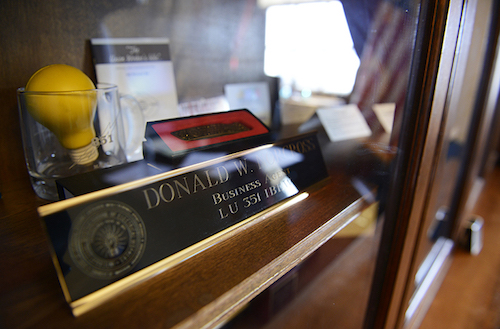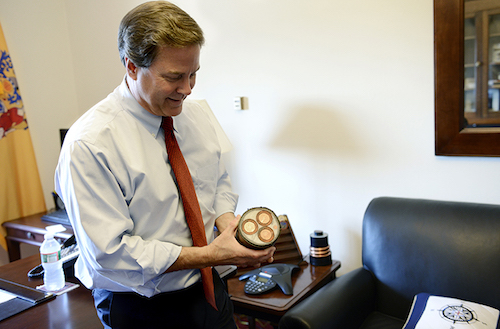New Jersey Rep. Donald Norcross -- the only active member of the IBEW in Congress—has been appointed to serve on the House Committee on Education and the Workforce.
The Education and Workforce Committee oversees all
government programs related to education as well as health care, job training,
and retirement security for workers. It was called the Education and Labor Committee
until the Republican majority renamed it in 2010.
Norcross, who was elected to his second term in Congress
last fall, will be the only union member to serve on the committee.

|
| In a display case, the business agent desk plate from the 11 years Norcross spent at Local 351. |

|
| Norcross holds a section of the wire he used to splice when he worked in Camden's waterfront refineries.
|
“It’s an honor to represent New Jersey’s working families on
the Education and Workforce Committee. This is a continuation of my lifelong fight
to defend hardworking men and women and make certain that every person has the
dignity of a good paying job,” Norcross said in a statement.
A journeyman inside wireman and member of Folsom, N.J.,
Local 351, Norcross worked with the tools for a decade on commercial and
industrial construction projects across the state. When Local 351 was formed by
the amalgamation of the three south New Jersey locals in 2001, then-Business
Manager Eddie Gant hired Norcross to be the local’s business agent on the west
side of the state.
“There are plenty of business owners in Congress, alongside
all the bankers and the lawyers, but there are precious few who worked with
their hands and their minds for a living. It is incredibly important that we
have one of our brothers in the room when laws are being made,” said IBEW
International President Lonnie R. Stephenson.
Norcross was elected to Congress in a 2014 special election
after serving four years as a state senator. In his first term in Washington,
Norcross was appointed to the Democratic House leadership, introduced
legislation to incrementally raise the minimum wage to $15 an hour, fought the
Trans-Pacific Partnership and formed the bipartisan Building Trades Caucus.